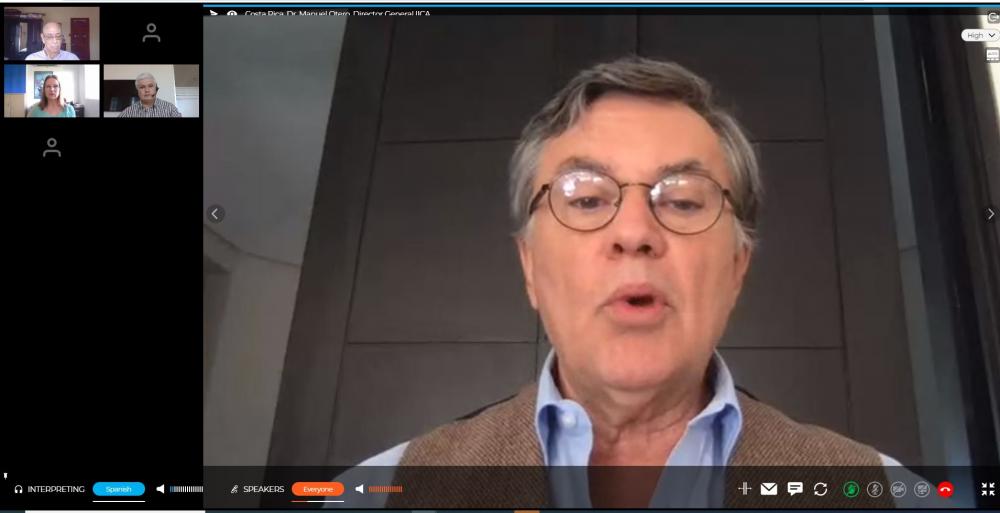Otero: “Agriculture is part of the solution in the fight against climate change”

San Jose, 4 March 2021 (IICA). The agriculture sector is part of the solution in the fight against climate change and plays a key role in countries’ ability to abide by the Paris Agreement. This was the view expressed by the Director General of the Inter-American Institute for Cooperation on Agriculture (IICA), Manuel Otero, at the launch of Regional Climate Weeks, an initiative spearheaded by the United Nations.
The activity—which will enjoy the participation of representatives from national and state governments, the private sector, financial institutions and civil society—aims to accelerate implementation of the treaty adopted in 2015, which seeks to limit global warming to below 2 degrees Centigrade, compared to pre-industrial levels.
Otero highlighted how resilient agriculture has proven to be during the pandemic and stated that the sector is undergoing profound changes in promoting sustainable development.
“Like any other economic activity”, he said, “agriculture bears some responsibility for greenhouse gas emissions. However, it is a strategic sector for the future, because it must take into account aspects of climate change mitigation and adaptation, without overlooking the issues of competitiveness, inclusion, resilience and sustainability. IICA is advocating for an agriculture sector in which farmers receive priority attention through long-term public policies and strong public-private partnerships, and are also empowered, with rural areas becoming regions of health and progress”.
The IICA Director General indicated that Latin America and the Caribbean is the major net exporter of food in the world, accounting for almost 14% of the global market, and thus agricultural activity has a profound socioeconomic impact on rural areas. However, the price paid to farmers, especially family farmers, represents a relatively low share of the final price paid by consumers, and this is often at the expense of good agricultural practices.
“The profitability crisis causes farmers to disregard conservation of production resources and soil health. In the end, this causes social problems and in many cases, migration to urban centers”, he said, citing the example of coffee cultivation. “A study, carried out by IICA and other institutions, revealed that a bartender in the United States takes home 22 times the earnings of a Central American coffee producer, from tips alone”.
The Virtual Round Table on Latin America and the Caribbean is being organized by the government of the Dominican Republic and its opening panel discussion included remarks by Patricia Espinosa, Executive Secretary of the United Nations Framework Convention on Climate Change (UNFCCC); Carolina Schmidt, Chile’s Minister of the Environment and President of the 2019 Conference of the Parties (COP) 25 on Climate Change; Alok Sharma, President-designate of COP 26, slated to take place this year; Inger Andersen, Executive Director of the United Nations Environment Program (UNEP); and Haoliang Xu, Director of the Bureau for Policy and Program Support of the United Nations Development Program (UNDP).
Espinosa stressed that 2021 is a critical year for the future of humanity, stating that, “This is an unprecedented opportunity to advance climate action and to carve our way out of the Covid-19 pandemic, building resilient and sustainable economies. Few generations have had that opportunity. We must move from the adoption of the Paris Agreement to its implementation, which is the only way we will be able to create a green and clean future”.
Espinosa also warned that in the eight months remaining before COP 26, countries must significantly reduce their emissions of pollutant gases and devise a clear roadmap to achieve a carbon neutral future. She stated that industrialized nations must fulfill their promise of mobilizing 100 billion dollars annually for policies to combat climate change.
On the other hand, the Chilean Minister, Carolina Schmidt, remarked that climate change is the most pressing challenging facing humanity this century.
As such, she said that, “Adapting and building resilience, while reducing vulnerability to extreme climate events that are already wreaking havoc on communities and destroying livelihoods around the world, are as important as decarbonizing our economies”.
Schmidt stated that climate change commitments assumed by each country should not be seen as unnecessary distractions amidst the severity of the health crisis. “Quite the contrary”, she said, “as they can be part of the solution, helping to devise routes to post-pandemic recovery aligned with the need to reduce emissions. Scientific evidence shows us that the time to act is running out and only through joint efforts will be able to rise to this challenge”.
The Executive Secretary of the Economic Commission for Latin America and the Caribbean (ECLAC), Alicia Bárcena, who participated in one of the panels, remarked that adaptation should be a priority for the region, which while only responsible for 8.3% of global greenhouse gas emissions, is one of the regions most affected by climate change.
Barcena argued that, “The issue must be addressed from the perspective of climate justice. Major emitters, such as China, India and the United States, must make the greatest effort. What our region needs most is funding for adaptation, which is our priority”.
Max Puig, Executive Vice-President of the National Council for Climate Change in the Dominican Republic, also raised the matter of climate justice. He reflected that the region is facing increasingly extreme climate phenomena that are “threatening the security of our people”, and asked that countries “be of one voice in calling for the establishment of solid and efficient mechanisms to compensate the losses caused by climate change-related atmospheric phenomena”.
The Virtual Regional Roundtables during Regional Climate Weeks will be held practically through the entire year and will create a platform for discussion about the opportunities for climate action and the path to reconstruction in the wake of a pandemic, ahead of the United Nations Climate Change Conference, COP26, scheduled for November.
More information:
Institutional Communication Division, IICA.
comunicacion.institucional@iica.int